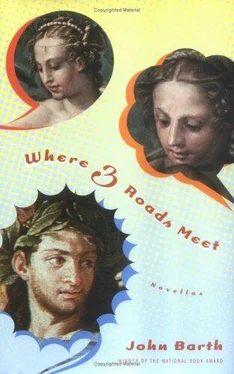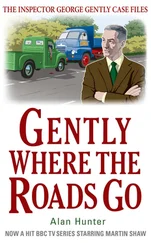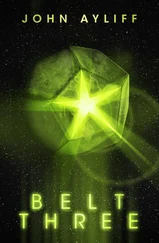F.: Yeah? How's that?
" Fred's Self-Appointed Sidekick beams, " here beamed that very fellow, "and with his right hand" — which now held, instead of the Swiss Army knife, a capped fountain pen—"bids our keen-eyed, not-so-Mere Reader to say on."
Adjusting with one forefinger a lick of her helmeted hair, "Yes, well: Speaking of herself in third person like Maestro Izzy, what she's just now remembering is that this buggy — which, by the way, since I'm its Wheel Three, I presume you guys to be Wheels One and Two of, in whatever order? — that this buggy, I was saying, isn't just the so-called Hero-cycle: It's also Fred I've-Been-Told's story's Dramatic Vehicle, right? As was established back in what we're calling retrospectively Part One, and unlike Phil Blank's Corolla in Part Two, which was just a lowercase vehicle."
F. & I. [more or less in unison]: Ergo?
"Ergo, guys, when ours ran out of gas just as I happened to be complaining in my Second Question that this I.B.T. tale is overdue for a capital-C Complication to turn the screws on its capital-C Conflict and advance its ditto-P Plot, what that Arresting Vehicular Coincidence amounts to — what we have on our narrative/dramaturgical hands right here right now — is nothing less than dot dot dot…"
"By George!" cried Fred. "A bona fide, gen-you-wine Complication!"
"Georg ina, " corrected now-demure-but-not-displeased-with-herself Ms. Reader, this time adjusting her rimless specs. "Just doing my job, fellows."
"And doing it well indeed," commended wire-rimmed Izzy.
Heartily agreed old Fred, "Good show!" And to his frontseat-mate then, "So?"
"So let Mademoiselle Lectrice read on," smoothly suggested that personage. "Next paragraph of this story, please, my dear? Followed by the next after that?"
"Uh, excuse me?" Looking around her rear seat, then the forward one, and the itemless landscape round about. " What next paragraph?"
"The one you just recited to us'll do, I suppose, that went Uh, excuse me, et cet? Followed by this one that I'm speaking and you're just now reading. On with our story, s.v.p.?"
Unless his head-nodding was a senior moment, Protagonist Fred seemed to find this proposal agreeable. Ms. Reader Georgina, on the contrary — having retrieved that earlier-flourished script-sheaf from under her butt, where she'd secured it back when their vehicle was speeding along, and fumbling now through its latter pages — protested, " What story? What next paragraph? Last time I looked, this thing here ended with the end of '——'s Story.'"
Maybe look again, suggested Izzy. She having so done, "Okay," Ms. puzzled G. acknowledged, "so now it ends with my asking you what in fact I was just about to ask you: How can I read what hasn't been written down yet? What's going on here?"
"Seems to Fred and me you're doing just fine." But he offered her the capped fountain pen. "Care to give this gizmo a try?"
His idea of a joke? she challenged him — her speech, for a change, paraphrased instead of quoted directly. In the first place, "Izzy," not she, was the self-declared Teller of this so-called tale; let the cobbler stick to his last! And in the second place, even if she were inclined to take over his job, which she most decidedly was not, these manuscript pages (although they now extended as if magically to the parenthesis in progress) were written on both sides of each sheet, leaving not a blank scrap for her to write on — or, come to think of it, for him or anybody else to write on! "Hey, now…?"
"Complications left and right!" Fred marveled. "Seems to me the lady has a point there, Iz. And that this out-of-gas story of ours is moving right along, even though we-all aren't. Who's driving?"
Acknowledged unruffled Isidore, "A point she'd have, friend, were't not that the pair of you seem to've forgotten our little Narrative-Point-of-View review back in Part Two. Wherein, be ye twain reminded, 'twas pointed out that while this 'I've Been Told' story both is Fred and is about Fred, its Teller this time around is Yours Truly — most explicitly so in Part Two, but at least arguably so in Parts One and Three as well, Teller having merely shifted narrative POVs between acts like a quick-change artist."
"Excuse me?" here objected bright-eyed but still mystified Georgina-the-Reader, who'd been listening attentively to this spiel, her chin resting on the back of her hands, which rested in turn on the inexorably lengthening script, itself resting now atop the front seatback. "It seems to this Mere Reader—"
"And right she is again," affirmed Izzy. What perhaps (with her indulgence) wanted clarification, he went on, was the term Teller, which comprises more than one aspect. For just as a Story is not its Teller ("Fred's not Izzy, is he?"), so also its Teller — in the sense of its Narrator, anyhow — is not its Author, their job descriptions being quite different even when, as here and there happens, Author and Narrator are two functions of the same functionary, or pretend so to be. Teller-in-the-sense-of-Author invents and renders into language either the story itself — its characters, setting, action, plot, and theme — or (as in present instance) some new version of a pre-existing story. Teller-in-the-sense-of-Narrator then delivers Author's invention — renders his rendition, so to speak — whether as a story character himself, like Present Speaker, or as a more or less disembodied narrative voice. Or, for that matter, as an embodied narrative voice, back in oral-tradition days when tales were literally told or sung, passed along from bard to bard instead of printed for silent perusal by individual Georginas.
"Sigh," sighed Fred. "Those were the days."
"Not for us quote individual Georginas they weren't," objected she. "You can 'Sigh,'sighed Fred all you want, but for us Mere Readers these are the days: Go at our own pace! Reread any passage we particularly enjoy or maybe don't quite understand. Skip ahead or check back; start or stop or hit Pause anywhere and anywhen we damn please — couldn't do that back there with Homer and Company! But we're off the subject, guys, which is, and I quote [reads aloud from current last lines of script]: 'Reads aloud from current last lines of script: Is Izzy our Author, or isn't he?' Who's writing this pedantical crapola? Is there a fourth wheel on this wagon?"
"Plus, How do we get the sumbitch rolling, Perfessor? adds Old-Fart Fred," adds Etc., tapping his bony chest. "How do we get me rolling?"
Instead of replying directly to those questions, imperturbable Izzy brandished again that afore-flourished fountain pen. "Notice it's capped, chaps: That's its point, one could say. Here fished forth to make the point that I myself am no more than Fred's willy-nilly teller du jour, not his author nor yours nor my own. Who our Author is, who knoweth? Not we Mere Fictional Characters! All we know is that while quote real people in the quote real world may do things out of their more-or-less-free will, all we MFCs have is the semblance thereof, while in fact we do precisely what Mister/Miz Author seeth fit to write that we do. Even Ms. Reader, once she entered this tale as its Georgina-the-Mere-Reader character, checked her own volition at the door: She may think she can exit our script anytime she wishes, but if she does, it's because Author decided to send her packing. End of speech, it says here."
She should be so lucky, commented the referred-to MFC — who, however (she went on to say), like the story she'd made the mistake of getting involved in, was going nowhere, at least not until she had an Isidorean answer to Fred's question: How do we get this out-of-gas jalopy up and running? If, as appeared to be the case, their real magical weapon/tool/whatever was not Izzy's Swiss Army knife but Author's uncapped pen, and if (as would appear to follow) the Mythmobile's ultimate fuel was the Ink of Inspiration, so to speak, then how do we get that pen filled and flowing — or, to change metaphoric implements, how put some fresh lead in the old pencil? Are we not back where we started in Part One, at the Place Where Three Roads Diverge, awaiting some refueled Dramatic Vehicle?
Читать дальше












